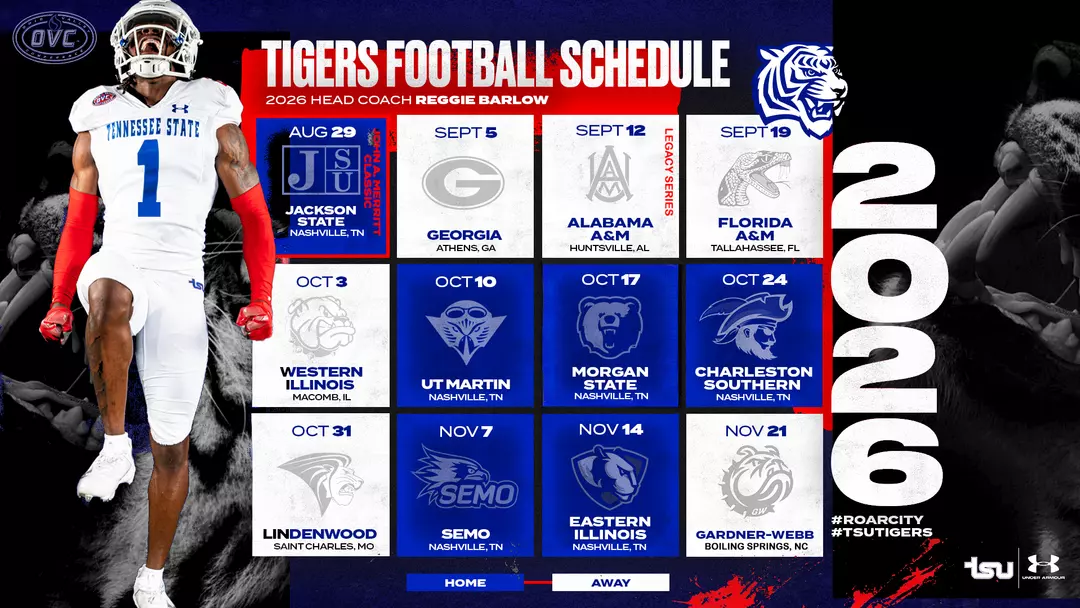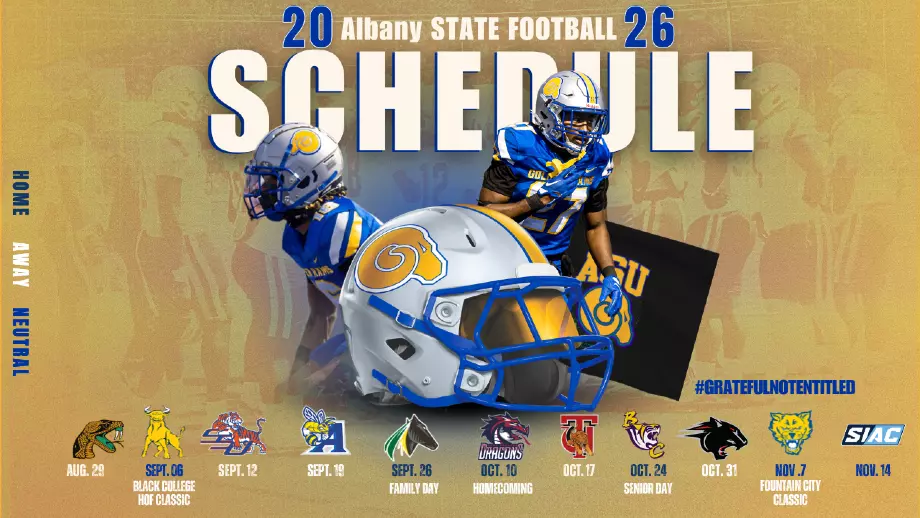Saturday Tennessee State and Alabama A&M will renew gridiron pleasantries in the first installment of the Legacy Series, a four-year alternating home and home series that reinvigorates the long-dormant matchup. Before this agreement, the two schools had not met since September 4, 2010, a contest won by Tennessee State, 27-14.
“We’re excited to launch the ‘Legacy Series’, a celebration of the rich history and excellence of Tennessee State University and Alabama A&M. This series honors the cultural and athletic legacies that continue to inspire our HBCU community,” said Tennessee State Director of Athletics Dr. Mikki Allen.
The upcoming contest has generated much excitement on the Tennessee State side of the equation, as its fanbase for many years has been starved for HBCU opponents, as those contests offer a tantalizing glimpse into athletic life many Tennessee State fans desire, which is to be an occupant of an HBCU conference. With the announced departure of Tennessee last month, the future of the OVC has once again started to come into question as well as Tennessee State’s place within it. The Ohio Valley Conference has hemorrhaged teams in recent years, with Jacksonville State and Eastern Kentucky departing in 2021, Belmont, Austin Peay, and Murray State exiting stage left in 2022. These defections led to the OVC partnering with the Big South Conference in 2023 to form the Big South OVC Football Association. The partnership combines the football-playing members – Charleston Southern, Eastern Illinois, Gardner-Webb, Lindenwood, Southeast Missouri, Tennessee State, Tennessee Tech, Western Illinois, and UT Martin into a single league that still enables the members to qualify for the automatic bid for the FCS Playoffs.
If this game were a SWAC matchup – As referenced in (Should Tennessee State … + SWAC)
The Southeastern Conference (SEC) made news when it announced in late August that the league would be adopting a nine-game conference schedule. Beginning in the 2026-27 season, each SEC team will play three permanent conference opponents and rotate through six others each season. This setup will see that teams will match up with every other program in the conference at least once every two years and conference members are required to schedule at least one Power Four non-conference opponent, or Notre Dame annually.
As this format puts the SEC in alignment with the other Power 4 Conferences, except for the ACC which currently schedules an eight-game conference schedule, it is seemingly only a matter of time before other leagues, including the Southwestern Athletic Conference, follow suit and move to a 9-game conference scheduling format. Applying these parameters to the SWAC, as illustrated in Should Tennessee State follow Tennessee Tech’s Lead + SWAC, with the SWAC expansion of Tennessee State and Clark Atlanta, bringing the total teams in the conference to 14 member institutions, each team will play five permanent conference opponents (rivals) and rotate through the rest of the field every two years. Similar to the recently announced SEC scheduling football format, this new SWAC format of a 9-game schedule will make sure that each of the conference teams will match up with every other program in the conference at least once every two years.
Since the NCAA Division I Council has approved a rule change, effective with the 2026 season, that allows all FCS (Football Championship Subdivision) teams to play up to 12 regular-season games every year. Previously, FCS teams were limited to 12 games only in seasons when the calendar afforded them 14 Saturdays between the first permissible playing date and the last playing date in November; in other years, they were typically limited to 11 games. The change also includes standardizing the start date of the FCS season: 13 weeks before the FCS playoff selection date (which falls on the Saturday before Thanksgiving). For example, in 2026 teams might begin as early as Thursday, August 27.
After conference expansion, moving to a 9-game football schedule in the SWAC offers both strategic and financial advantages that align with the evolving landscape of college athletics. Strategically, a 9-game conference schedule ensures a more balanced and competitive framework, particularly after the SWAC previously expanding with the high-profile program of Florida A&M along with the premise of further expansion of a second high-profile program in Tennessee State along with the previous expansion of Bethune-Cookman and the addition of a second private institution of Clark-Atlanta which would ultimately bring both the Nashville and Atlanta markets.
It enhances the integrity of the conference standings by reducing scheduling disparities, where some teams currently avoid playing top-tier opponents in a given season. A standardized schedule increases the likelihood of marquee matchups that draw national attention, bolstering the SWAC’s reputation as a relevant college football super conference at the FCS level and a dynamic league in terms of the brand value to corporations seeking connection to the sports industry in terms of the HBCU sports culture. This is particularly the case after the announcement of SWAC TV this past offseason during the SWAC Media Day back in July.
This allows the SWAC conference members to increase scheduling flexibility. Programs will have more room to arrange non‑conference matchups, “money games” against Football Bowl Series (FBS) teams, or additional home games — all of which can help with revenue, exposure, and fan engagement. It would also allow the SWAC specifically in this scenario, it would also allow the league to schedule an extra game to expand the conference schedules and keep many of the rivalry games on teams’ schedules.
Financially, the move unlocks substantial revenue potential through additional media rights and ticket sales. A ninth conference game guarantees at least one additional high-value matchup per team each season—games that are far more lucrative than typical non-conference contests. These matchups are immensely attractive to broadcasters, potentially driving up the value of future media deals and providing better returns for member institutions. Additionally, stronger schedules can help SWAC teams that did not earn the bid to the Cricket Celebration Bowl to remain competitive in the postseason FCS selection process. In sum, the shift to a 9-game schedule is a forward-looking decision that enhances both the product in the field and the financial future of the SWAC.

Tennessee State Tigers
- Jackson State Tigers
- Florida A&M Rattlers
- Alabama A&M Bulldogs
- Texas Southern Tigers
- Clark-Atlanta Panthers

Alabama State Hornets
- Alabama A&M Bulldogs
- Florida A&M Rattlers
- Jackson State Tigers
- Clark-Atlanta Panthers
- Bethune-Cookman Wildcats

Alabama A&M Bulldogs
- Alabama State Hornets
- Tennessee State Tigers
- Bethune-Cookman Wildcats
- Clark-Atlanta Panthers
- Arkansas at Pine Bluff Golden Lions

Alcorn State Braves
- Jackson State Tigers
- Mississippi Valley State Delta Devils
- Southern Jaguars
- Grambling State Tigers
- Arkansas at Pine Bluff Golden Lions

Bethune-Cookman Wildcats
- Florida A&M Rattlers
- Clark-Atlanta Panthers
- Alabama State Hornets
- Alabama A&M Bulldogs
- Mississippi Valley State Delta Devils

Clark-Atlanta Panthers
- Bethune-Cookman Wildcats
- Alabama A&M Bulldogs
- Alabama State Hornets
- Florida A&M Rattlers
- Tennessee State Tigers

Florida A&M Rattlers
- Bethune-Cookman Wildcats
- Southern Jaguars
- Arkansas at Pine Bluff Golden Lions
- Tennessee State Tigers
- Alabama State Hornets

Grambling State Tigers
- Southern Jaguars
- Prairie View A&M Panthers
- Texas Southern Tigers
- Alcorn State Braves
- Jackson State Tigers

Jackson State Tigers
- Southern Jaguars
- Alcorn State Braves
- Grambling State Tigers
- Tennessee State Tigers
- Alabama State Hornets

Mississippi Valley State Delta Devils
- Alcorn State Braves
- Arkansas at Pine Bluff Golden Lions
- Prairie View A&M Panthers
- Bethune-Cookman Wildcats
- Texas Southern Tigers

Prairie View A&M Panthers
- Texas Southern Tigers
- Grambling State Tigers
- Southern Jaguars
- Arkansas at Pine Bluff Golden Lions
- Mississippi Valley State Delta Devils

Southern Jaguars
- Grambling State Tigers
- Jackson State Tigers
- Alcorn State Braves
- Prairie View A&M Panthers
- Florida A&M Rattlers

Texas Southern Tigers
- Prairie View A&M Panthers
- Grambling State Tigers
- Tennessee State Tigers
- Clark-Atlanta Panthers
- Mississippi Valley State Delta Devils

Arkansas at Pine Bluff Golden Lions
- Mississippi Valley State Delta Devils
- Prairie View A&M Panthers
- Alabama A&M Bulldogs
- Alcorn State Braves
- Grambling State Tigers




